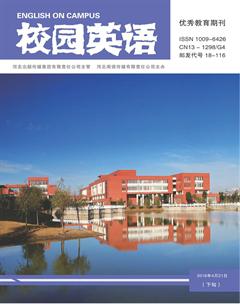AFeedbackandSuggestedSolutionofInterKnowledgeProbleminEnglishLanguageTeaching
余静
【Abstract】As a supplement of higher education in our country, higher vocational colleges cultivate plentiful talents for our modernization construction. Recently, with the development of globalization and the cooperative osculation with foreign countries, most employers require higher for the graduates. In this case, the English language teaching of vocational college needs to keep pace of the times and cultivate satisfactory practical talents. This article illustrates by the example of a typical problem in English teaching, making a serious reflection on the aspects of fundamental conceptions, basic principles and teaching strategies, and proposes some feasible suggestions.
【Key words】A Feedback; Suggested Solution
In recent years, with more importance being attached to vocational and technical education, higher vocational education has sustained, healthy and rapid development. Meanwhile, English, as a universal language, has also become a required course for students in higher vocational colleges. Unlike the undergraduate college universities, the English language teaching in higher vocational college focuses on cultivating the students application ability, aiming at equipping them with necessary knowledge of English language, improving their core competence, and supporting the development of professional skills.
As a model of Guizhou province higher vocational college, our school actively responds to national policy, conducting a series of experimental teaching reform. In a sense, higher vocational English teaching reform can succeed or not, only by learning some teaching models or skills is not enough, it mainly depends on the teachers cognition of fundamental conceptions, basic principles and teaching strategies of language teaching. Therefore, it is very urgent and important to change the teaching concept and improve the ability of teaching reflection. As an English teacher in higher vocational college, I have found the inter knowledge problem becomes the most conspicuous problem in the teaching process so that I have summed up few suggestions to overcome this problem.
“Inert Knowledge Problem”, proposed by the famous philosopher Whitehead, which refers to students can understand the explicit rule, but they do not necessarily apply it. Although we know it is too hard to solve this problem, but we can make the problem intractable by rejecting the dichotomous thinking. In order to overcome the inert problem, to enhance students attitude, and to sustain students motivation, I think we need to change the way we think immediately, change the dichotomous thinking, and try to build a bridge between language forms and functions.
As far as I am concerned, it is disadvantaged to isolate one of the subsystems of language in language teaching. For one case, if our language teaching is only based on the perspective of language forms, it may bring about such problem that students learn from a decontextualized way, may be they can understand the explicit rules well, but they cannot apply the knowledge into practical communication. Just like the famous educator Larsen-Freeman said, “control of the grammar of a language can be empowering, but following its rules unswervingly can be imprisoning. The study of grammar is both loved and loathed.” For another case, if our language teaching is only based on the perspective of language function, it may bring about such problem that students cannot really understand the structure of the language, especially in some complex sentences, they may have no problem in communication, but they cannot analyze complicated paragraphs, it is not beneficial for further study. So, perhaps the form-function dichotomy is a better way in language teaching. There is not just one aspect of language, it has various properties in different situations. Only we take the factor into consideration, and combine more language properties within our language teaching, can the students grasp a language more comprehensively.
References:
[1]Krashen,S.D.1982.Priciples and Practice in Second Language Acquisition[M].Oxford:Pergamon Press.
[2]Larsen-freeman,D.2000.An Introduction to Second Language Acquisition Research[M].Beijing:Foreign Language Teaching and Research Press.
[3]Larsen-Freeman,D.2000.Techniques and Principles in Language Teaching[M].Oxford:Oxford University Press.
[4]Lightbown,P.2000.Classroom SLA Research and Second Language Teaching[J].Applied Linguistics 21(4):431-462.
[5]王笃勤.大学英语自主学习能力的培养[J].外语界,2002(5):17-23.
[6]文秋芳.英语学习的成功之路[M].上海:上海外语教育出版社.

